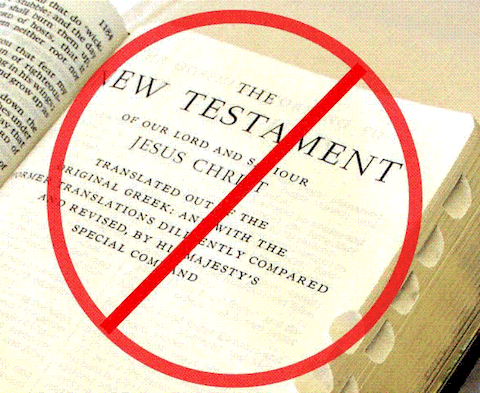
1001 Errors in the Christian Bible
Home
Dedication
Matthew
Mark
Luke
John
Acts
Contact Us
Mark -- Errors 189-195
#189
Mark 9: (KJV)
5 “And Peter answered and said to Jesus, Master, it is good for
us to be here: and let us make three tabernacles; one for thee, and one
for Moses, and one for Elias.”
Compare to:
Matthew 17: (KJV)
4 “Then answered Peter, and said unto Jesus, Lord, it is good
for us to be here: if thou wilt, let us make here three tabernacles; one
for thee, and one for Moses, and one for Elias.”
The word translated by Mark 9:5 above as “Master” should be
“Rabbi” and that is how a majority of modern Christian translations
present it. “Rabbi” in Hebrew means “teacher” and
in Jesus’ supposed time would have been used as a noun. The word
later became used as a title. Even though “Matthew” is for the
most part copying “Mark” he didn’t like the thought of
Jesus being addressed as “Rabbi” (too Jewish) so he changed
the word to “Lord” (the Greek “kurie”). Give that
goy a kupie doll.
#190
Mark 9: (KJV)
5 “And Peter answered and said to Jesus, Master, it is good for
us to be here: and let us make three tabernacles; one for thee, and one
for Moses, and one for Elias.”
Compare to:
Matthew 17: (KJV)
4 “Then answered Peter, and said unto Jesus, Lord, it is good
for us to be here: if thou wilt, let us make here three tabernacles; one
for thee, and one for Moses, and one for Elias.”
The Greek of Matthew 17:4 translates “let me make here three tabernacles”.
“Let us make” is a mistranslation. The motivation for the mistranslation
is to make Matthew 17:4 agree with Mark 9:5. About half of modern Christian
translations have this mistranslation.
#191
Mark 9: (KJV)
13 “But I say unto you, That Elias is indeed come, and they have
done unto him whatsoever they listed, as it is written of him.”
There’s no description in the Christian Bible that the Elijah from
the Tanakh appeared before Jesus and fulfilled Tanakh prophecy. Jesus
claims that John the Baptist fulfilled the role of Elijah and that’s
how the prophecy of Elijah was fulfilled. This claim is bizarre considering
that just a few sentences earlier Elijah (the supposed real one) appeared
in a transfiguration with Jesus.
#192
Mark 9: (KJV)
13 “But I say unto you, That Elias is indeed come, and they have
done unto him whatsoever they listed, as it is written of him.”
There is no prophecy in the Tanakh that Elijah would suffer during his
mission or fail in any sense. Compare to:
Matthew 17: (KJV)
12 “But I say unto you, That Elias is come already, and they knew
him not, but have done unto him whatsoever they listed.”
When the author of “Matthew” ran this part of “Mark”
through the Zerox machine he whited out “as it is written of him”
because he realized there was no such prophecy.
#193
Mark 9: (KJV)
16 “And he asked the scribes, What question ye with them?”
Compare to:
Matthew 17: (KJV)
14 “And when they were come to the multitude, there came to him
a certain man, kneeling down to him, and saying, 15 Lord, have mercy on
my son: for he is lunatick, and sore vexed: for ofttimes he falleth into
the fire, and oft into the water.”
In Mark’s account Jesus has to ask what’s going on. As usual
Matthew has changed Mark so that Jesus is not asking a question which
would imply lack of knowledge on his part.
#194
Mark 9: (KJV)
17 “And one of the multitude answered and said, Master, I have
brought unto thee my son, which hath a dumb spirit;”
Compare to:
Matthew 17: (KJV)
15 “Lord, have mercy on my son: for he is lunatick, and sore vexed:
for ofttimes he falleth into the fire, and oft into the water.”
“Matthew” consistently changes “Mark’s” “master/teacher”
to “Lord” which is what the Christians of ‘Matthew’s”
time referred to Jesus as. Matthew has anack(for the)cronyistic.
#195
Mark 9: (KJV)
28 “And when he was come into the house, his disciples asked him
privately, Why could not we cast him out? 29 And he said unto them, This
kind can come forth by nothing, but by prayer and fasting.”
Compare to:
Matthew 17: (KJV)
19 “Then came the disciples to Jesus apart, and said, Why could
not we cast him out? 20 And Jesus said unto them, Because of your unbelief:
for verily I say unto you, If ye have faith as a grain of mustard seed,
ye shall say unto this mountain, Remove hence to yonder place; and it
shall remove; and nothing shall be impossible unto you.
21 Howbeit this kind goeth not out but by prayer and fasting.”
According to “Mark” the reason for the disciples’ failure
was they didn’t use the right method (prayer. “Fasting”
is a later addition not supported by the evidence of the early manuscripts).
According to “Matthew” the reason for the disciples’ failure
was a lack of faith. Matthew’s finish to the story “Howbeit
this kind goeth not out but by prayer” is the perfect ending, just
not the way Christians think it is. In the story Matthew just gave Jesus
didn’t use prayer to make that kind go out, he used the standard
rebuke maneuver. Mark’s story here is actually just an apology to
try and explain why officially designated followers of Jesus who were
supposedly given the authority from Jesus to heal anyone could not heal
some people (like those who were really sick). The apology is that anyone
who is not immediately healed must have the type of demon which can only
be cured through praying for an INDEFINITE time period (like until they
get better, die, are branded a non-believer or every one forgets all about
them, whichever comes first).